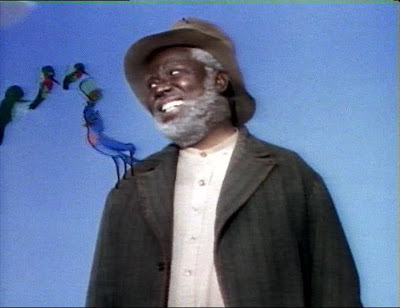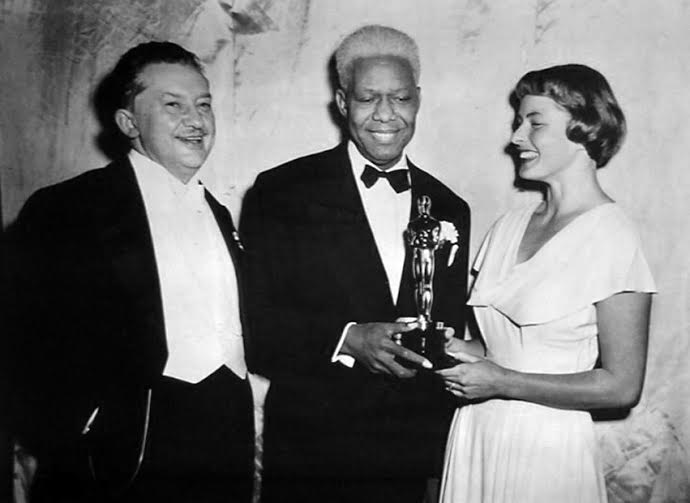 Tim here to kick off a daily miniseries for the team. It might seem disingenuous, if not outright perverse, to begin The Film Experience's rough chronological celebration of Black History Month by taking at peek at one of the most infamously racist movies ever made, but for good or bad, Song of the South (1946) is an important milestone in the all-too-thin history of African-Americans and the Oscars. Seven years after Hattie McDaniel's groundbreaking Best Supporting Actress win for Gone with the Wind (we recently dove deep into that film else we'd start with her) James Baskett became the very first black man to receive an Academy Award, and the last for 16 years.
Tim here to kick off a daily miniseries for the team. It might seem disingenuous, if not outright perverse, to begin The Film Experience's rough chronological celebration of Black History Month by taking at peek at one of the most infamously racist movies ever made, but for good or bad, Song of the South (1946) is an important milestone in the all-too-thin history of African-Americans and the Oscars. Seven years after Hattie McDaniel's groundbreaking Best Supporting Actress win for Gone with the Wind (we recently dove deep into that film else we'd start with her) James Baskett became the very first black man to receive an Academy Award, and the last for 16 years.
Not, mind you, a competitive Academy Award. Baskett was the last adult actor to receive an Honorary Oscar for a single performance (rather than for a career), with the inscription:
For his able and heart-warming characterization of Uncle Remus, friend and story teller to the children of the world, in Walt Disney's Song of the South".
[More...]
 Baskett receives his Honorary from none other than Ingrid Bergman!
Baskett receives his Honorary from none other than Ingrid Bergman!
The possibility of Baskett cracking the 1947 Best Actor race (the film, though released in December 1946, somehow competed in the '47 Oscars instead) isn't one that seems to have been considered or hoped-for by anyone, not even Disney himself, who personally campaigned with Academy President Jean Hersholt for the ailing Baskett to receive an award on the grounds that he had created the character almost totally without direction. When we are in the position that Walt Disney hustling for Song of the South is an act of progressivism, we are truly staring down the gun barrel of institutional racism.
Whatever forced the Academy into its half-measure effort in recognizing him, the fact remains that Baskett (who died just months after receiving the award, at age 44) was quite wonderful in the role of Uncle Remus, former slave, current sharecropper, and friend of talking cartoon animals. Indeed, without getting into the questions of whether Song of the South is profoundly racist (it is) and as a result deserves to be banned by its parent company (it does not), Baskett's performance is one of the handful of things that's incontestably worth saving from the film.
It's important to remember context: in 1946, when the film was new, an African-American in a leading role of this kind in a white-production had almost never happened. He's not the protagonist – he fills precisely the same narrative function that Mary Poppins does in her own movie – but Remus is fully rounded and given a range of emotions and thoughts that set him apart from virtually every other minority character in mainstream Hollywood films of that generation. Some of that has to do with the simple fact that he's not called upon to be the high-strung, squealing comic relief, like 95% of the black men in movies of the '40s. Most of it is simply because Baskett doesn't play the character like a stock type, even if the screenplay otherwise feels littered with stock types, regardless of race. There is warmth, insight, charisma, and most importantly, a clear thread of self-respect and dignity running through Baskett's performance of a role that could easily be a cringe-inducing collection of paternalistic white notions of post-war Southern black life.

Insofar as the live-action portions of Song of the South aren't totally objectionable (the three animated sequences – including Baskett's superb work voicing the villainous Br'er Fox – is infinitely less odious, which is why it's easier to find), Baskett's calming, rich, and very human presence is the primary reason why. It would be far too much to argue that he redeems the film from its unconsciously racist tendencies; he does, however, humanize them. To view it in 2015, it's easy to see all the stereotypes and Uncle Tom-isms, and the general sense of pandering underlying it all, but this was, for good or ill, the first truly strong black male lead performance in mainstream American movies. It is wonderful that it has been improved upon so much, so many times in the generations since, but it's important to still recognize and appreciate Baskett's work for what he accomplished in his own time.